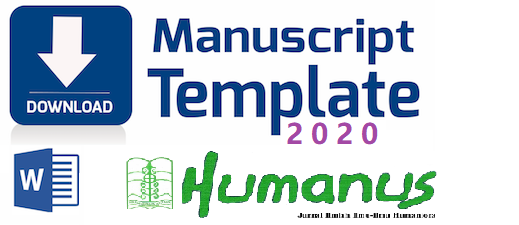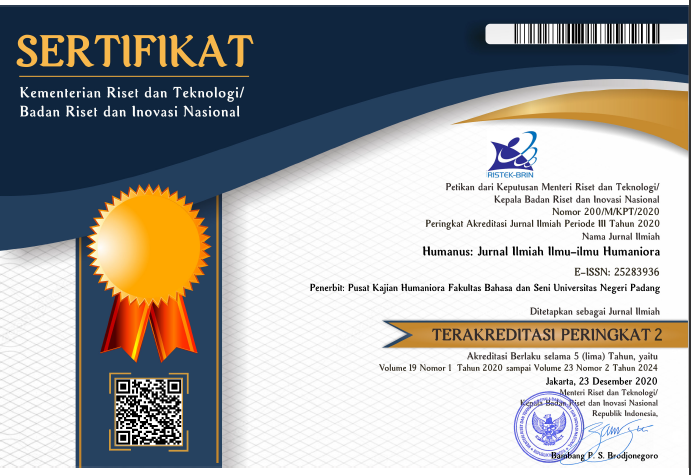A Critical Discourse Analysis of Oliver Prass’ Talk on “Antiasian Hate in the United States” in Kompas-TV
 ), Erna Andriyanti(2), Sulis Triyono(3),
), Erna Andriyanti(2), Sulis Triyono(3), (1) Yogyakarta State University
(2) Yogyakarta State University
(3) Yogyakarta State University
 Corresponding Author
Corresponding Author
Copyright (c) 2021 Humanus
DOI : https://doi.org/10.24036/humanus.v20i2.112963
Full Text:
 Language : en
Language : en
Abstract
Racism is not only an internal issue of a country while discussing pluralistic society. The racism in the US must attain multitudes international attentions due to diversity of the people, including Asians with diverse races. The purposes of this study are to investigate how the ideology of racism is constructed through language and why the racism is occurred in pluralistic society of the US. The data for this study is two bilingual talks of Oliver Prass in KOMPAS TV. The CDA is adopted as tool to explore and discover racism ideology though language representation. The result on textual dimension with transitivity process depicts that racism ideology occurs in different forms to show effect of personal feeling and psychological effect from racist people toward the victims. In discursive dimension, to emphasize a hidden agenda of a discourse requires the speaker status and position during producing the language; for instance, as social activist, victims, and Indonesian. Then in social practices implies the reason why racism is existing; those are as a defense mechanism, economic anxiety, personality profile and power as well as authority abuse by the government that may lead to racism treatment on minorities by discrimination and negative prejudice.
Keywords
References
Alim, H.S, Rickford, J.R., and B. A. . (2016). Raciolinguistics: How Language Shapes Our Ideas About Race. In Raciolinguistics. Oxford University Press. https://doi.org/10.1093/acprof:oso/9780190625696.001.0001
Azzuhri, M. (2012). Konsep multikulturalisme dan pluralisme dalam pendidikan agama. Forum Tarbihyah, 10(9), 47–48.
BBC NEWS INDONESIA. (2021). Kejahatan kebencian terhadap orang Asia-Amerika di AS meningkat: Dari penghinaan hingga pembunuhan. https://www.bbc.com/indonesia/dunia-56249817
Cheryan, S & Bodenhausen, G. . (2020). Model Minority. In S. M. Caliendo & C. D. McIllwain (Eds) (The Routle, Issue October). Abingdon, UK: Routledge. https://doi.org/10.4135/9781412963879.n370
Edara, I. R. (2020). Anti-Asian Racism in the Shadow of COVID-19 in the USA: Reported Incidents, Psychological Implications, and Coping Resources. Journal of Psychological Research, 2(3). https://doi.org/10.30564/jpr.v2i3.1932
Fairclough, N. (1992). Discourse and Social Change. Cambridge: Polity Press.
Kim, E. H., & Taylor, K. A. (2017). The Model Minority Stereotype as a Prescribed Guideline of Empire: Situating the Model Minority Research in the Postcolonial Context. Journal of Southeast Asian American Education and Advancement, 12(2). https://doi.org/10.7771/2153-8999.1156
KOMPAS TV. (2021a). Oliver Pras: Sebagai Asia, Saya Sudah Dibully dari Kecil - ROSI (4). https://www.youtube.com/watch?v=ERamhcO6UsM
KOMPAS TV. (2021b). Sentimen Anti Asia Meningkat, WNI di AS Diminta Waspada. https://www.youtube.com/watch?v=UB3wVtPsPuY
Lub, V. (2015). Validity in Qualitative Evaluation. International Journal of Qualitative Methods, 14(5), 160940691562140. https://doi.org/10.1177/1609406915621406
Madani, M., Paradigmatik, K., Rozi, M. F., Kunci, K., Pluralisme, :, & Islam, P. (1967). Pluralisme Dan Multikulturalisme Dalam Membangun. H.A.R. Tilaar, 11(5).
Maddern, S. W. (2013). Melting pot theory. The Encyclopedia of Global Human Migration, 359–362. https://doi.org/10.1002/9781444351071.wbeghm359
Matthiessen, C & Halliday, M. A. . (2014). Haliday’s Systemic Functional Grammar 4th Edition (Christian M.I.M Matthiessen (ed.); 4th ed.). Routledge.
Norman Fairclough. (2001). Language and Power (2nd ed.). USA: Longman Inc.
Rosa, J., & Flores, N. (2017). Unsettling race and language: Toward a raciolinguistic perspective. Language in Society, 46(5), 621–647. https://doi.org/10.1017/S0047404517000562
Ruth Wodak and Michael Meyer. (2009). Methods of Critical Discourse Analysis (Second Edi). London: SAGE Publications Ltd.
Shih, K. Y., Chang, T. F., & Chen, S. Y. (2019). Impacts of the Model Minority Myth on Asian American Individuals and Families: Social Justice and Critical Race Feminist Perspectives. Journal of Family Theory and Review, 11(3), 412–428. https://doi.org/10.1111/jftr.12342
Siswanta, J. (2017). Pengembangan Karakter Kepribadian Anak Usia Dini ( Studi Pada PAUD Islam Terpadu Di Kabupaten Magelang Tahun 2015 ). 11(1), 97–118.
The Office of the United Nations High Commissioner for Human Rights (OHCHR) in cooperation with The United Nations Educational, S. and C. O. (UNESCO). (2005). Dimensions of Racism. Proceeding of a Workshop to Commemorate the End of the United Nations Third Decade Combat Racism and Racial Discrimination. http://scholar.google.com/scholar?hl=en&btnG=Search&q=intitle:of#5
Weiss, P. (2021). A rising tide of hate and violence against Asian Americans in New York during COVID-19: Impact, causes, solutions.
 Article Metrics
Article Metrics
 Abstract Views : 612 times
Abstract Views : 612 times
 PDF Downloaded : 202 times
PDF Downloaded : 202 times
Refbacks
- There are currently no refbacks.
Copyright (c) 2021 Humanus

This work is licensed under a Creative Commons Attribution-NonCommercial 4.0 International License.











